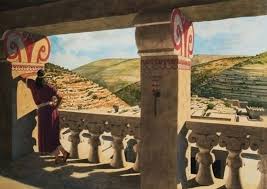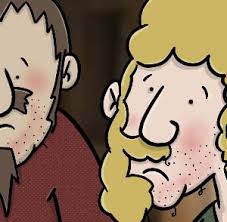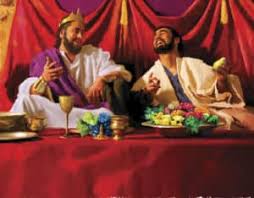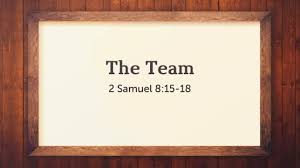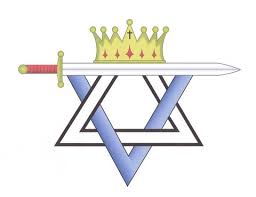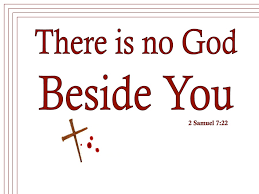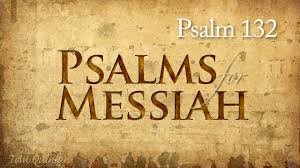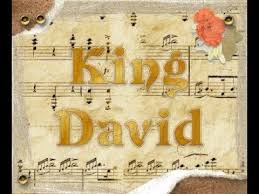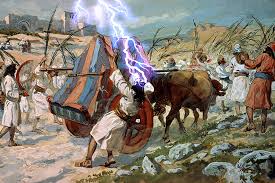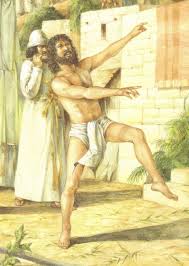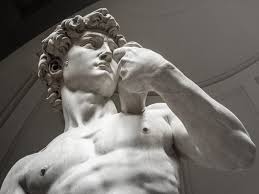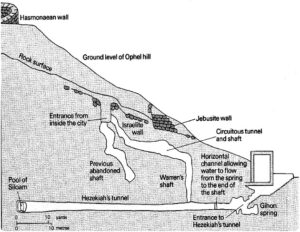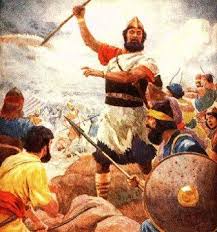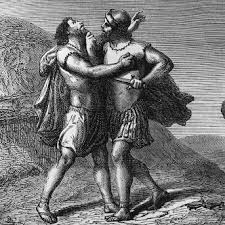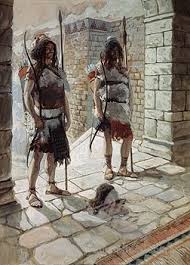Dd – Nathan Rebukes David Second Samuel 12: 1-14
Nathan Rebukes David
Second Samuel 12: 1-14
Nathan Rebukes David DIG: Why does Nathan speak to David with a parable? Why does the absence of justice and mercy in Nathan’s account enrage David so much? How could David have fed contentment and avoided coveting? What is God’s perspective on gratitude? Who will lie with David’s wives in broad daylight? How does David’s response to Nathan’s rebuke compare with Sha’ul’s response in similar situations (First Samuel 13:11-12, 15:13-26)?
REFLECT: In what ways has a lack of gratitude led you to sin as it did David? When reminded of all that God has done for you, might you be kept from intentional, premeditated sin? We reap not only what we sow, but also what others have sown. How are you suffering because of what someone else has done? Who might be suffering because of what you’ve done? Who is the “Nathan” in your life? How did you respond? Are our sins ever really secret?
984 BC
God’s displeasure: But the things David had done were evil in the eyes of ADONAI (Second Samuel 11:27b). Opposed to countries such as Egypt, where Pharaoh was regarded as divine, in Isra’el, the king had to submit to God who had chosen him and observe all the commandments given in the Torah (Deuteronomy 17:15-20). It was the task of the prophet to encourage the king to fulfill these obligations, and to rebuke him in YHVH’s name if he failed to do so. Samuel had found Sha’ul stubbornly opposed to accepting rebuke. Now Nathan was to discover how David would react to the truth about his sin. Much depended on the prophet’s method of approach, which in this instance, provides a model and reveals exceptional insight into human reactions to personal guilt and the failures of other people.335
The trial: Therefore, perhaps after a year, ADONAI sent Nathan to David. It wasn’t an easy task, David had been covering his sins for at least six months. But it was obvious that Nathan had prepared carefully for his encounter with the king. So when Nathan came to David he presented the case as if asking for a ruling on an injustice. He said: There were two men in a certain town, one rich and the other poor. The rich man had a very large number of sheep and cattle, but the poor man had nothing except one little ewe lamb he had bought. He raised it, and it grew up with him and his children. The lamb shared his food, drank from his cup and even slept in his arms. It was like a daughter to him.
Now a traveler came to the rich man, but the rich man refrained from taking one of his own sheep or cattle to prepare a meal for the traveler who had come to him. Instead, he took the ewe lamb that belonged to the poor man and prepared it for the one who had come to him (Second Samuel 12:1-4). David listened intently to the carefully chosen Hebrew words of Nathan.
David burned with righteous anger against the man and said to Nathan, “As surely as the LORD lives, the man who did this must die because he did such a thing and had no pity” (Second Samuel 12:5-6). We must pause a moment to notice how David had become very harsh towards other people. The Torah does not say anything about the robber of a lamb being killed, although it certainly says he had to restore the loss four times over (Exodus 22:1). But David said the man who behaved like that should be killed. Many have seen in David’s fourfold restitution an allusion to the death of four of David’s sons, namely Bathsheba’s first son (Second Samuel 12:15-19), Amnon (Second Samuel 13:28-29), Absalom (Second Samuel 18:14-15) and Adonijah (First Kings 2:25).
Have you ever noticed that when you are sinning in your own life you become very critical of sin in the lives of other people? The person who hides an uneasy conscience and a sense of guilt may strike out in anger against the sin of another. Is that why some of us are so merciless with another believer whose halo slipped? Is that why we have no gospel for the believer who falls? It may not be because we are so very holy, but because we are so unholy, that we condemn the thing in another that we refuse to face in our own lives. Let us not forget the words of our Master: Let any one of you who is without sin be the first to throw a stone (John 8:7).336
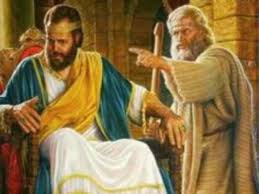
The verdict: Nathan had skillfully presented his case and gained an opening that enabled him to deliver the punch line. The prophet realized that though David was very angry, he was also unguarded and ready for the sword of the Spirit to pierce his heart (Ephesians 6:17; Hebrews. 4:12). With one quick thrust, Nathan said: You are the man (two words in Hebrew: ata ha’ish)!337 Two simple Hebrew words, yet what volumes they speak! All of David’s defenses came crashing down with those words. He stood naked before his judge. He had condemned himself!
Nathan had come to deliver the judgment of Ha’Shem, and therefore, he dare not soften the impact of his words. Indeed the prophet spoke in the first person as if God Himself was speaking: This is what YHVH, the God of Isra’el says: I anointed you king over Isra’el and I delivered you from the hand of Sha’ul. I gave your master’s wives into your arms (by law of succession, Sha’ul’s wives belonged to David). I gave you all Isra’el and Judah. And if all this had been too little, I would have given you even more. The real sin was this: Why did you despise the word of the LORD by doing what is evil in My eyes? The Torah said not to murder (see commentary on Exodus, to see link click Dp – You Shall Not Murder), commit adultery (see commentary on Exodus Dq – You Shall Not Commit Adultery), or covet your neighbor’s wife (see commentary on Exodus Dt – You Shall Not Covet Anything That Belongs To Your Neighbor). David did all three.
You struck down Uriah the Hittite with the sword and took his wife to be your own. Although David had arranged his death from afar, he was just as guilty of murder as if he had thrust Uriah through with his own sword. You killed him with the sword of the Ammonites, Isra’el’s enemy, making it all the worse (Second Samuel 12:7-9).
It would be difficult to find higher testimony to Hebrew standards of life, and to Hebrew theories of society, than the condemnation that the writer, and everyone else, passes on David. To the eastern mind, for a king to take the wife of a subject is quite normal and natural, for the sovereign is well within his rights. Few men in David’s position would have felt it necessary either to conceal the act or get rid of the husband. But in Isra’el a man was a man, even though he were a subject and of foreign birth, and his rights of property and person must be respected. Characteristic also is the rebuke of Nathan and the repentance of the king. Neither would have been conceivable in any other nation of the ancient east, and the fact that the story comes to us from a hand of a contemporary, adds to our sense of the very high standard of religion and morals that were already unmistakable in Isra’el.
The sentence: Now, therefore, the sword will never depart from your house, because you despised Me and took the wife of Uriah the Hittite to be your own (Second Samuel 12:10). David’s dynasty, unlike Sha’ul’s, would continue. But that good news was modified by the ongoing war and bloodshed. The whole nation would be continually reminded of David’s sin as they fought continuing battles and witnessed the chaos in his family.
This is what ADONAI says: Out of your own household I am going to bring calamity on you. Before your very eyes I will take your wives, just as you took Bathsheba, and give them to one who is close to you, and he will sleep with your wives in broad daylight (Second Samuel 16:21-22). You did it in secret. But what you did in secret, I will do this thing in broad daylight before all Isra’el (Second Samuel 12:11-12).
The rabbis teach that Nathan’s rebuke was not that David committed any real sin, but Nathan’s words were only moral in nature and not legal. In this way they explained away David’s actions and his sins.
The pardon: The condemned prisoner knew that the verdict was true and the sentence was just, so without any argument, he confessed: (two words in Hebrew: chatati YHVH) I have sinned against YHVH (see Df – O God, A Broken and Contrite Heart You Will Not Despise). Such a confession could have been regarded as political suicide, but the king humbled himself. Nathan replied immediately: The LORD in His mercy has taken away your sin. You are not going to die. That was like music to his soul! Sin is desperate and dangerous, and it always, always brings judgment, yet it cannot extinguish the love of God. If we claim to be without sin, we deceive ourselves and the truth is not in us. But if we confess our sins, he is faithful and just to forgive us our sins and purify us from all unrighteousness (First John. 1:8-9).
The Torah tells us what David deserved – death (Leviticus 20:10; Deuteronomy 22:22), but grace shows us what David received – forgiveness and commuting of his death sentence. 338 David’s sin was forgiven, but there would be consequences: Because by doing this you have shown utter contempt for God, the son born to you will die (Second Samuel 12:13-14). When the LORD restores us, He uses the rod also, and life is never quite the same again. Sometimes we have to drink the bitter cup. We can be forgiven, but still have to reap what we have sown. Shortly, one of David’s sons would rape his sister, and his son Absalom became a murderer and even tried to overthrow his father to be king of the Land. Consequently, there were many stormy days and nights ahead for David, but he knew it was not the judgment of a vindictive God, but the chastisement of a loving heavenly Father. For ADONAI disciplines those He loves (Hebrews 12:6a CJB).
As that chastisement cut David to the heart, then, praise God, YHVH healed the wound. The pendulum began to swing back the other way, voices began to speak kindly to him again, and love came to his path at the end of his journey. The loyalty of the people returned to him, and before he went to rest with his fathers he would still say: The righteous person may have many troubles, but the LORD rescues him from them all (Psalm 34:19).
God sets our sins before His face; even our most secret sins are revealed in the light of His countenance. He breaks our hearts and humbles us and brings us to confession and repentance in order to make us holy, to restore to us the years that the locusts have eaten, and to present us faultless before the throne (Joel 2:24; Jude 1:24).339



